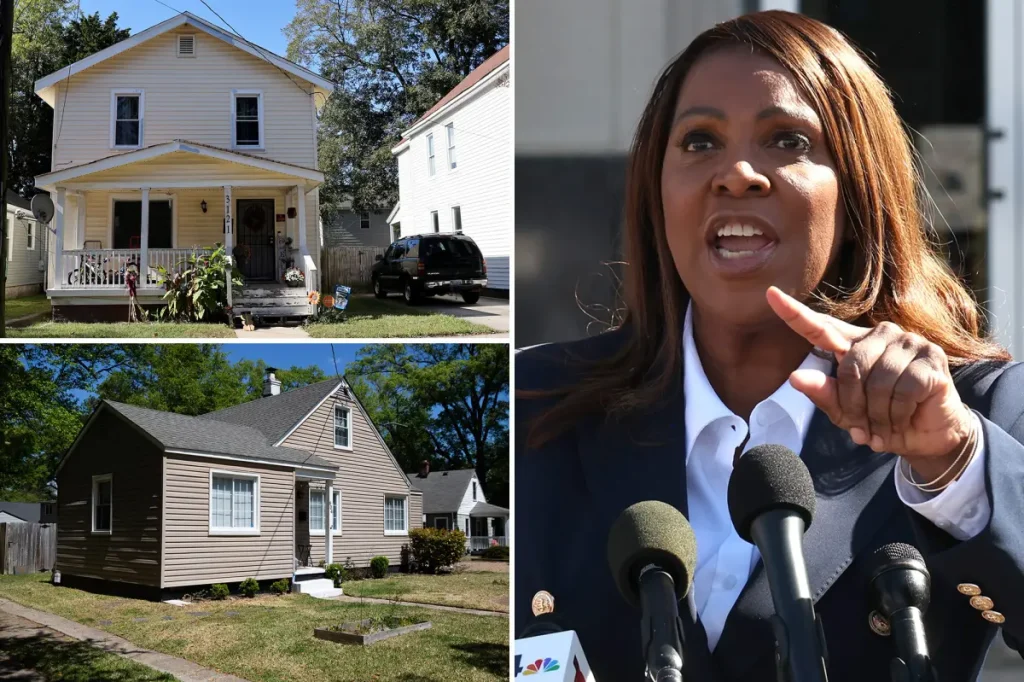Letitia James’s Norfolk Houses: A Tale of Legal Troubles and Family Complications
In the quiet neighborhoods of Norfolk, Virginia, two modest homes have recently found themselves thrust into the national spotlight, not for their architectural merit or historical significance, but because of their connection to New York Attorney General Letitia James. Since James purchased these properties—ostensibly for family members—they have become focal points of both legal controversy and persistent police attention. The properties, acquired in 2020 and 2023 respectively, have collectively seen law enforcement dispatched approximately two dozen times since James’s relatives took up residence. These frequent police visits paint a complicated picture of a high-profile public official’s attempt to provide for family members with troubled pasts, while raising serious questions about potential financial impropriety in the process of acquiring these homes.
The first property, purchased by James in August 2020 for $137,000, became home to her grandniece, Nakia Thompson, and Thompson’s three children. Since their arrival, police have responded to the residence twelve times for various issues including vandalism, domestic disturbances, suspicious persons, and to serve warrants and subpoenas. The frequency of these calls increased dramatically in October of this year, with six calls occurring in just two weeks following national scrutiny of the property in connection with James’s legal troubles. Thompson, who testified before a grand jury that she lives rent-free in the three-bedroom house, carries a substantial criminal record. Her legal issues span multiple states, with outstanding warrants in North Carolina for failing to complete probation on charges including assaulting a government official. In Virginia, Thompson has accumulated charges ranging from possession of burglary tools to grand larceny. Most recently, she was charged with using threatening language over public airways after allegedly threatening her child’s assistant principal.
The second property, acquired by James in 2023 with a $219,780 mortgage loan, has become home to another cluster of relatives with their own legal complications. This residence is occupied by James’s grandniece Cayla Thompson-Hairston, along with Cayla’s mother Shamice and sister Courtney. Like the first property, this home has attracted significant police attention, with ten visits from officers between April 2024 and April 2025. The calls ranged from warrant service to domestic disputes and reported assaults. Cayla’s legal history includes a 2024 charge for lying about her felony record while attempting to purchase a firearm—a disqualification stemming from a 2020 felony charge of malicious wounding that occurred when she was a juvenile. Her criminal record also includes a 2019 shoplifting incident alongside her sister Nakia and a 2024 grand larceny charge for stealing merchandise worth over $1,600 from a Walmart, which was later reduced to petit larceny through a plea agreement.
The convergence of these family complications with James’s professional life took a serious turn in October when she was indicted on federal bank fraud charges. The allegations center on misrepresentations James allegedly made regarding how she would use the property purchased in 2020. According to prosecutors, loan paperwork bearing James’s signature indicated she would personally occupy the residence, despite her working more than 300 miles away in New York. This misrepresentation, they claim, allowed her to secure a more favorable interest rate on her loan. Similar allegations have emerged regarding the 2023 property purchase, which has become the subject of a criminal referral. James has firmly denied any wrongdoing in connection with these charges, though she faces up to 60 years in federal prison if convicted.
These cases highlight the complex intersection of personal and professional ethics for public officials. While James may have had benevolent intentions in providing housing for troubled family members, the manner in which she acquired these properties has raised serious legal questions. The repeated police calls to both residences further complicate the narrative, suggesting that whatever support James intended to provide has not succeeded in creating stable living situations. The contrast between James’s high-profile position as New York’s top law enforcement official and the persistent legal troubles of her relatives living in these homes creates a striking dissonance that has fueled public interest in the case.
As this story continues to unfold, it serves as a cautionary tale about the potential pitfalls of mixing family assistance with financial decisions, especially for those in positions of public trust. The frequency of police visits to these properties—averaging more than once a month since their purchase—speaks to ongoing instability that extends beyond the immediate legal questions about the mortgage applications. For James, who has built her career on holding others accountable, these allegations and the surrounding family circumstances present both a personal and professional challenge. Whether her intention was simply to help family members in need or something more complicated, the legal process will ultimately determine if her actions crossed the line from family support to financial fraud, with significant potential consequences for her future in public service.


